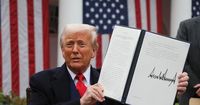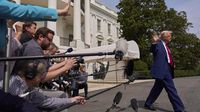In a dramatic shift in U.S. trade policy, President Donald Trump has launched a sweeping series of tariffs that threaten to reshape global commerce and ignite a trade war, raising concerns over price hikes and economic downturns. The new tariffs, which include a baseline tax of 10% on all imported goods and higher rates on specific countries, represent the most significant increase in trade barriers in over a century, with some tariffs soaring as high as 50%.
On April 2, 2025, Trump announced these tariffs in a speech at the White House, claiming they were necessary to correct what he described as unfair trade practices that have harmed American workers and manufacturers. "Our country has been looted, pillaged, raped and plundered," he stated, asserting that the U.S. has been taken advantage of by other nations for years.
The tariffs are expected to impact a wide range of products, with estimates suggesting that U.S. consumers could see prices rise significantly. The Yale Budget Lab projects that these tariffs could increase consumer prices by approximately 2.3%, costing American households an average of $3,800 annually. Specific categories, such as clothing, could see price increases of 17% due to higher import costs from Southeast Asia and Bangladesh.
As the news of the tariffs broke, financial markets reacted sharply. On April 3, the Dow Jones industrial average plummeted nearly 4%, losing 1,679 points, while the S&P 500 and Nasdaq also faced significant declines. Analysts warn that the tariffs could push the global economy towards recession, with JP Morgan raising the likelihood of a downturn to 60% by the end of the year.
Trump's tariffs are particularly notable for their broad reach, affecting not only adversaries like China, which faces a 34% reciprocal tariff, but also allies such as Canada and Mexico, which are subject to a 25% tariff on various imports. Even countries with which the U.S. enjoys trade surpluses, like the United Kingdom and Argentina, are not exempt, facing a minimum tariff of 10%.
In a bid to justify these tariffs, Trump has framed them as a necessary measure to balance trade deficits with other countries. For instance, the U.S. goods trade deficit with the European Union was reported at $235.6 billion in 2024. However, critics argue that the methodology used to calculate these tariffs is flawed and does not accurately reflect the true trade barriers faced by U.S. goods.
Economists have voiced skepticism about the effectiveness of these tariffs in reducing the trade deficit. Experts like Kimberly Clausing from UCLA noted that tariffs could actually reduce U.S. exports, thereby exacerbating the trade imbalance. Furthermore, the tariffs are viewed as regressive taxes that disproportionately affect lower-income households.
In response to Trump's tariff announcement, countries around the world have expressed their intentions to retaliate. The UK government is currently drafting a list of U.S. products that could face retaliatory tariffs if an agreement is not reached by May 1, 2025, to reduce the 10% tariff on UK exports to the U.S. Business Secretary Jonathan Reynolds has been consulting with UK firms to assess the potential impact of these tariffs.
China has also vowed to respond to Trump's aggressive tariff strategy, with President Xi Jinping calling the measures an act of bullying. The European Union, facing a 20% tariff, and other nations have similarly indicated that they will take countermeasures.
Meanwhile, within the U.S., the political ramifications of Trump's tariff plan are becoming evident. A bipartisan bill introduced by Senators Chuck Grassley and Maria Cantwell aims to give Congress final approval over tariffs imposed by the president, reflecting growing unease among some lawmakers regarding the administration's trade policies.
Despite the backlash, Trump remains steadfast in his belief that these tariffs will ultimately benefit the U.S. economy. In a recent statement, he claimed that the tariffs would bring "$6 trillion or $7 trillion" into the country, promising a significant economic boom. However, many analysts and lawmakers are skeptical of this assertion, with some warning that the tariffs could lead to increased costs for consumers and diminished economic growth.
As the situation develops, businesses are scrambling to adapt to the new trade landscape. Automaker Stellantis announced it would temporarily lay off U.S. workers and halt production in Canada and Mexico due to the tariffs, while General Motors plans to ramp up U.S. production.
In conclusion, Trump's sweeping tariffs mark a pivotal moment in U.S. trade policy, one that could have far-reaching consequences for the global economy. As countries respond with their own measures and domestic industries adjust to the new reality, the long-term impacts of these tariffs remain uncertain. With negotiations ongoing and the potential for escalation, the world watches closely as the trade war unfolds.







